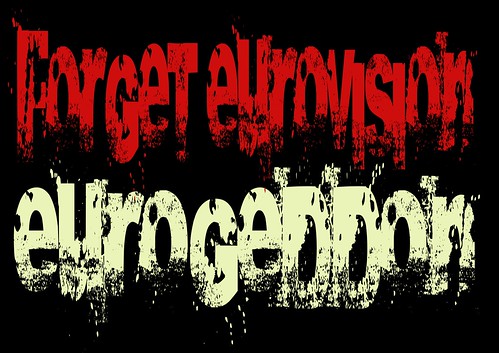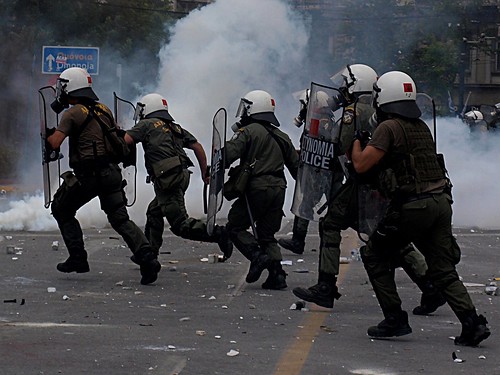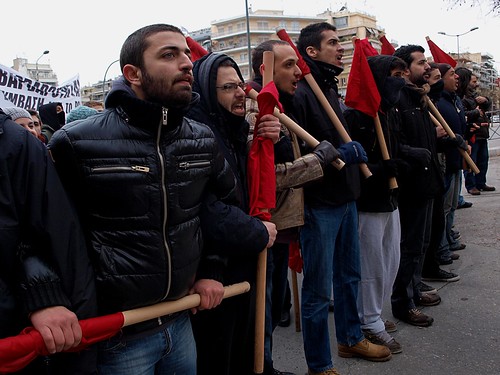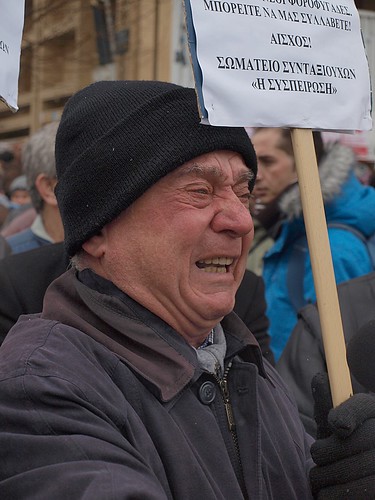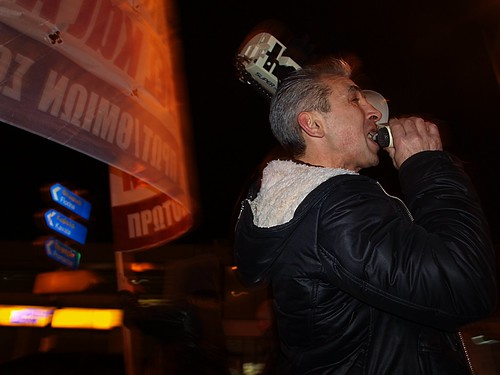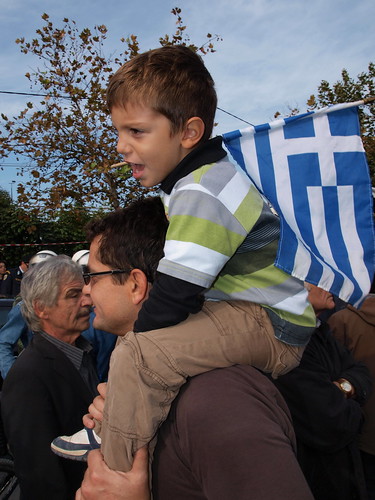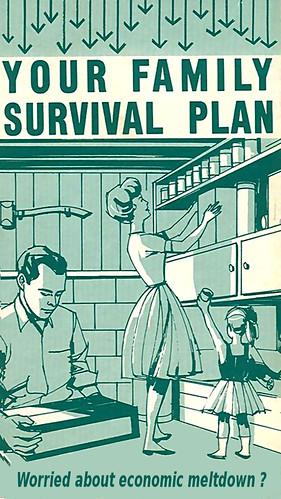Showing posts with label debt crisis. Show all posts
Showing posts with label debt crisis. Show all posts
Friday, December 14, 2012
Thursday, May 17, 2012
Thursday, May 10, 2012
Sunday, May 06, 2012
Peering into the future - Some predictions for the Greek election results

It's now just after 5pm here in Greece and within a couple of hours the voting will have finished and the first exit polls will be published. unlike many other elections the outcome of today's vote is far from clear. The largest party is most likely to be the conservative New Democracy with about 20-25%, followed by PASOK with 10-15% (the numbers are necessarily vague, a product of wildly differing opinion poll results). This is in sharp contrast to the 2009 national elections in which these two parties got the lion share of the vote with 78% combined, reflecting the stranglehold they have had over power since the late 70's.
However, beyond these two predictions not much else can be said for the possible make up of a future Greek government. The ECB, EU and IMF are all banking on these two parties being able to scrape together a majority in parliament in order to continue with the latest round of austerity measures scheduled for June and July. The leaders of PASOK and New Democracy, while swearing blind to the contrary are both hoping their electoral base will have held firm enough to give them a place in a coalition government and so avoid bloody internal conflict involving both backbenchers and rank and file party members. Both Venizelos and Samaras are by no means loved universally loved by their own supporters and a failure to get into power would open up still raw wounds .
On the other hand many other smaller parties are picking up support from disgruntled ND/PASOK voters and that is really the joker in the pack, threatening to overturn the political status quo that was created in the aftermath of the fall of brutal Regime of the Colonels in 1974. Some parties such as the rightist Independent Greeks are new creations whilst others such as the Neo-Nazi Golden Dawn have a longer, if more savage lineage, either way they are attracting votes at a rate that would have been inconceivable even a couple of years ago.
On the left of the spectrum the old school communist party KKE has gained ground as have other leftist parties such as The Radical Left (SYRIZA) and the newly minted Democratic Left with some estimates saying their combined share of the vote may pass 40%.The one thing that unites such disparate groups is their opposition to the austerity package imposed by Greece's creditors, however what else could possibly bring them together remains a mystery.
I'm going to put my money where my mouth is and say that I believe that the polls will produce a three party coalition government including PASOK, New Democracy and possibly Independent Greeks party. I base this prediction on nothing more scientific than a hunch and past experience of Greek politics (though give the sweeping changes going through the system that may not be the best guide). the thing to remember when analysing politics here is that ideological labels often count for little when power is concerned and so a coalition will be based on mutually aligned interests rather than political overlap.
If such an alliance does take power I believe that it is destined to fall apart as the political cost of yet more job cuts and tax hikes takes its toll. So quite possibly Greece will be going to the polls once more before September.
Saturday, May 05, 2012
Have you got what it takes to be part of the new Greek/EU middle class?
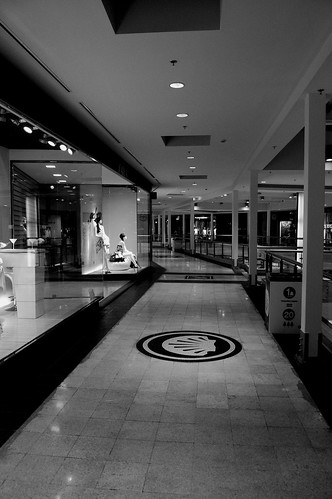
Tired of being part of the herd? Want to stand out in a crowd? Take our new Austerity Superstar Challenge and see if you have the Right Stuff to make it in today's European Union. Tick if the following applies to you.
1-It's the end of the month and you still have money in your wallet.
2-You paid all your bills on time.
3-Turning on the heating doesn't bring you out in a cold sweat.
4-When you go to the supermarket you use a shopping trolley and not a basket.
5-You have paid holidays.
6-You go away on holiday.
7-You still use the phrase, "fill it up" at petrol stations.
8-Many of your friends are employed, some are even getting paid.
9-You shopped for something that cannot be eaten.
10-You haven't locked away all your credit cards.
Friday, March 30, 2012
Debt crisis puts European project in jeopardy
Is this the future of Europe? When rioting broke out in Athens in previous years it was seen as a purely local phenomenon, taken as yet more evidence by foreign press that the Greeks were an unruly and undisciplined bunch who refused to see sense.
The idea propagated in much of the international press was that the the austerity measures imposed by the country's creditors were the only sensible solution for the nation and that refusal to knuckle down was was a refusal to accept reality. I remember being interviewed by the BBC and the first question was why the Greeks were so upset about being "saved". The reporter seemingly unaware of the harsh conditions of the bailout deal.
Two years on the Greek economy is in free fall beset with a disintegrating private and public sector which is shedding jobs at an unprecedented rate. If that wasn't enough, the government's attempt to balance the books by rising taxes on everything from bread to boats has just sped up the decline. At every single juncture an increase in taxation has been matched with a fall in consumption leading to even less money flowing into the coffers.
Despite two years of patent failure IMF and EU officials continue to claim that their policy recommendations have been ignored and that the Greek government has brought this disaster upon itself. Yet, in nations which have adopted troika policies more comprehensively the results are the same. In Spain and Portugal (always seen by foreign financial press as the model student) the same cycle of decline and debt is also playing out and with it a growing level of violent dissent.
Yesterday's images from Madrid and Barcelona echo those seen recently in Athens and other Greek cities as young people facing a future without hope or work work out their resentments in the streets.With youth unemployment in both country's reaching 50% a potential generation gap is opening up as young Europeans start to associate the EU with poverty and joblessness.
Even if the European ideal survives the current Eurozone crisis the damage done to its image in the eyes of the continent's youth may mean that it's future will be in doubt as young Europeans enter political life and see the union, not as a guarantor of unity and prosperity but an force for disruption and inequality.
The idea propagated in much of the international press was that the the austerity measures imposed by the country's creditors were the only sensible solution for the nation and that refusal to knuckle down was was a refusal to accept reality. I remember being interviewed by the BBC and the first question was why the Greeks were so upset about being "saved". The reporter seemingly unaware of the harsh conditions of the bailout deal.
Two years on the Greek economy is in free fall beset with a disintegrating private and public sector which is shedding jobs at an unprecedented rate. If that wasn't enough, the government's attempt to balance the books by rising taxes on everything from bread to boats has just sped up the decline. At every single juncture an increase in taxation has been matched with a fall in consumption leading to even less money flowing into the coffers.
Despite two years of patent failure IMF and EU officials continue to claim that their policy recommendations have been ignored and that the Greek government has brought this disaster upon itself. Yet, in nations which have adopted troika policies more comprehensively the results are the same. In Spain and Portugal (always seen by foreign financial press as the model student) the same cycle of decline and debt is also playing out and with it a growing level of violent dissent.
Yesterday's images from Madrid and Barcelona echo those seen recently in Athens and other Greek cities as young people facing a future without hope or work work out their resentments in the streets.With youth unemployment in both country's reaching 50% a potential generation gap is opening up as young Europeans start to associate the EU with poverty and joblessness.
Even if the European ideal survives the current Eurozone crisis the damage done to its image in the eyes of the continent's youth may mean that it's future will be in doubt as young Europeans enter political life and see the union, not as a guarantor of unity and prosperity but an force for disruption and inequality.
Tuesday, February 14, 2012
Sunday, February 12, 2012
Waiting for the Greek Götterdämmerung
Prime minister Lukas Papademos last night warned his fellow Greeks that failure to reach agreement on the latest austerity measures in parliament today would bring disaster to the indebted nation. Such dramatic talk in perhaps hardly surprising in the country that gave the world the word, apocalypse and reflects the fear those in power feel about the possibility that the legislation will not pass, or even worse will produce a wave of protest so intense that it will stall its implementation.
For the last three days there have been a series of strikes and marches against the latest cuts and job losses, but they are just a warm up for the big event which will take place later today at 5pm Athens times when people will start to gather for a series of nationwide rallies.
For over two years Greek voters have been told that austerity will save the country and yet all people have seen is a huge drop in living standards as the economy has collapsed and prices have soared. Caught between these two pincers many have despaired that will be able to survive financially as bills pill up and incomes from pensions and wages keep on falling.
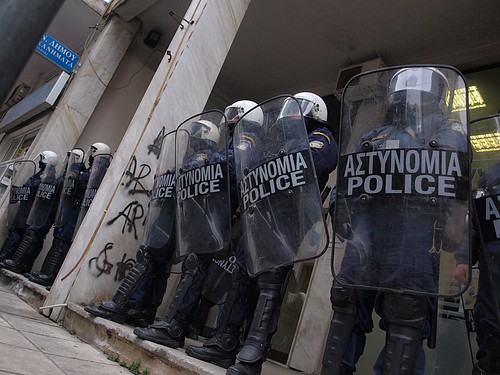
The situation has not been helped by a political system that is widely despised as being both inept and deeply corrupt. This has been reflected not only in the falling poll figures for those parties in power but also the seemingly endless clashes between riot police and protesters that occur whenever government members are spotted in public.
Those who call upon Greeks to make more sacrifices are exactly those most unwilling to give up the priviledges they have accrued whilst in power, a fact that few outside parliament have failed to notice.
The reality is that Greece has ceased to be a sovereign nation in anything but name, it's economic policy, spending decision and hence the vast majority of decision usually made in the name of the nation state are being dictated by the country's creditors who have demanded a heavy tribute in return for their intervention.
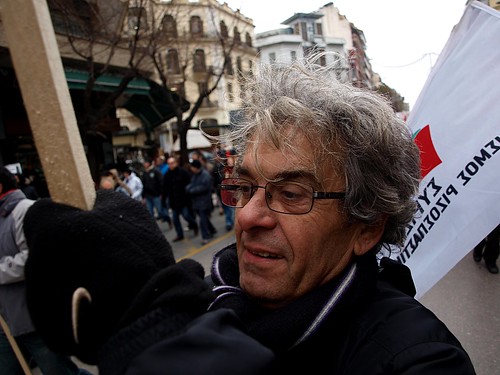
The fiscal policies being imposed have slashed GDP, pushed up unemployment and all but destroyed any real chance of the economy recovering for the forseeable future. In such a situation using talk of bankruptcy to scare people into supporting yet more of the same is simply not going to succeed as so many have, to all intents and purposes already been bankrupted.
What is left for the government and its supporters in the the media, (which to a large extent is controlled by domestic oligarchs heavily invested in the banking sector) are a series of crude threats warning of massive shortages in food and other basic goods should the country renege on its debt agreements.
Tonight in Athens's Syntagma Square we will see if the riot police can contain the groundswell of popular anger now building up. It will be a scene repeated in towns and cities across the country as people gather once more to say no to a future which holds nothing but poverty and decline for the next decade.
Friday, February 10, 2012
Greek pensioner breaks down in tears during TV interview
When the interviewer asked him how the latest austerity measures had affected him the pensioner broke down in tears.
Thousands took to the streets of Thessaloniki, Greece for the latest in a series of protests aimed at overturning government plans to introduce yet more austerity measures.
More strikes and marches have been called for the next two days
Thousands took to the streets of Thessaloniki, Greece for the latest in a series of protests aimed at overturning government plans to introduce yet more austerity measures.
More strikes and marches have been called for the next two days
Greeks take to the streets after austerity agreement
Taken tonight in the northern port city of Thessaloniki during a protest march against the latest round of austerity measures which have crippled the Greek economy. During the demonstration protesters briefly occupied two radio stations and read out messages on air calling upon people to join further demonstrations planned for the coming days.
Thursday, February 02, 2012
We've come here to chew bubblegum and kick ass...and we're all out of bubblegum

We've come here to chew bubblegum and kick ass...and we're all out of bubblegum, a photo by Teacher Dude's BBQ on Flickr.
Adapted from John Carpenter's They Live
Thursday, January 12, 2012
Trekonomics - The German finance establishment's contribution to the Dismal Science
The term Trekonomics (neologism derived from Star Trek & Economics) was inspired by the article, Germans and Aliens in the New York Times by economist Paul Krugman. In a nutshell Krugman argues that the insistence by German leaders on all EU members producing a budget surplus can only be achieved if we start exporting off-world.
"But the Germans believe that their own experience shows that austerity works: they went through some tough times a decade ago, but they tightened their belts, and all was well in the end.
Not that it will do any good, but it's worth pointing out that Germany's experience can only be generalized if we find some space aliens to trade with, fast."
New York Times
Sunday, December 18, 2011
Saturday, December 17, 2011
EU Death Star II
"Governor Rehn: National legislatures will no longer be of any concern to us. I have just received word from Berlin that Merkel has dissolved them permanently. The last remnants of the Old Republics have been swept away forever.
General Sarkozy: But that's impossible! How will the Merkel maintain control without the bureaucracy?
Governor Rehn: The regional governors now have direct control over their territories. Fear will keep the local governments in line. Fear of this battle station."
General Sarkozy: But that's impossible! How will the Merkel maintain control without the bureaucracy?
Governor Rehn: The regional governors now have direct control over their territories. Fear will keep the local governments in line. Fear of this battle station."
Wednesday, November 02, 2011
Greeks say NO to their own government
The Greek prime minsiter's decisionto hold both a vote of confidence in parliament and a national referendum on lastest austerity measures has taken the world's money markets by storm.
Even within Giorgos Papndreou's own PASOK party the decision has been met with mixed reactions. Whilst cabinet ministers have said they fully support the PM in this, backbenchers are rebelling with some saying they will vote against their own party if a referndum goes ahead, even calling for a government of "national salvation".
Opposition parties have been thrown into confusion by the referendum as well, The main opposition party, New Democracy has come out against it and is calling for elections. many smaller parties on the left are also against it, believing it a PR tactic to divert the public's attention from more important issues.
On the other hand the Greek public have thrown up their hands as far as the current political system is concerned. The nationwide protests and disruption of last Friday's national day parades made that clear to politicians who were booed and in some cases physically attacked by disgruntled voters.
The fact that polls show ever decreasing support for the two main political parties (figures for smaller parties have remained more or less static) shows that whatever the countries leaders may announce they are not in the position to say they speak for anything other than a small minority of the electorate. In such a situation the massive cuts in wages and public services and the prospect of a decades worth of painful austerity continue to have very little public support. Quite the opposite, Greeks across the political spectrum feel betrayed by their leaders and are in mood to go along with more of their follies.
The next crunch point will probably be Friday's vote of confidence which is likely to see the fall of Papandreou's as rebel PASOK MPs vote against their own party. The problem still remains who or what will take their place as no other party has a popular mandate to take over the reins of power and how do politicians campaign for re-election when voters would just as soon lynch them as give them their support?
On the other hand the annual 17th November anniversay of the fall of the Regime of the Colonels is just round the corner and this year a generation of Greeks raised on stories of heroic opposition to a hated regime will once again take to the streets across the country.
Even within Giorgos Papndreou's own PASOK party the decision has been met with mixed reactions. Whilst cabinet ministers have said they fully support the PM in this, backbenchers are rebelling with some saying they will vote against their own party if a referndum goes ahead, even calling for a government of "national salvation".
Opposition parties have been thrown into confusion by the referendum as well, The main opposition party, New Democracy has come out against it and is calling for elections. many smaller parties on the left are also against it, believing it a PR tactic to divert the public's attention from more important issues.
On the other hand the Greek public have thrown up their hands as far as the current political system is concerned. The nationwide protests and disruption of last Friday's national day parades made that clear to politicians who were booed and in some cases physically attacked by disgruntled voters.
The fact that polls show ever decreasing support for the two main political parties (figures for smaller parties have remained more or less static) shows that whatever the countries leaders may announce they are not in the position to say they speak for anything other than a small minority of the electorate. In such a situation the massive cuts in wages and public services and the prospect of a decades worth of painful austerity continue to have very little public support. Quite the opposite, Greeks across the political spectrum feel betrayed by their leaders and are in mood to go along with more of their follies.
The next crunch point will probably be Friday's vote of confidence which is likely to see the fall of Papandreou's as rebel PASOK MPs vote against their own party. The problem still remains who or what will take their place as no other party has a popular mandate to take over the reins of power and how do politicians campaign for re-election when voters would just as soon lynch them as give them their support?
On the other hand the annual 17th November anniversay of the fall of the Regime of the Colonels is just round the corner and this year a generation of Greeks raised on stories of heroic opposition to a hated regime will once again take to the streets across the country.
Saturday, October 29, 2011
For the Greek government the writing is on the wall following latest protests
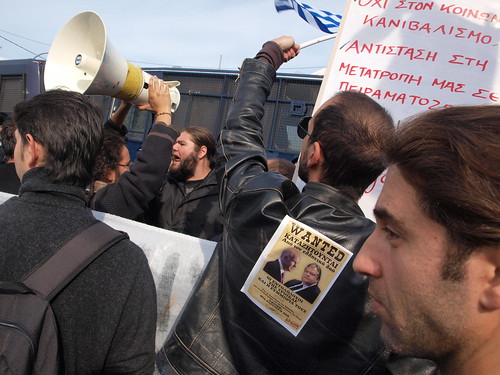
It's not often you get to see history made in front of your very eyes, however, that is exactly what I witnessed yesterday during the protests here in Thessaloniki that saw the cancellation of the city's annual military parade and forced the president of Greece to flee the area along with the country's defence minister.
To those unfamiliar with the institution, 28th October is a national holiday in Greece and every year towns and neighbourhoods organise parades to honour those who fell while fighting an Italian invasion in 1940. The celebration is known as No day after the refusal by Athens to allow Mussolini's army to enter Greek territory and is a day loaded with signifigance for many Greeks, akin to Remembrance Day in terms of the hold it has on the national consciousness so the fact that the parade was abandoned and those present refused to let the army march is an unprecedent event. It's almost as if bystanders flooded Whitehall during Remembrance Sunday and forced David Cameron and the rest of the cabinet to flee.
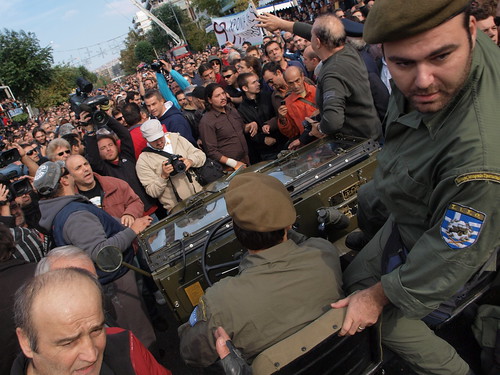
While over the last few years people have started to use 28th October events to air grievances the numbers have been small and many other Greeks have found such incidents an insult to the memory of the war dead. All that changed yesterday to surprise and amazement of most involved. For the country's political leadership it signalled the end of an era when they could command the loyalty (sometimes grudgingly given) of their electorate and showed them definitively that they are no longer welcome in any sphere of public life.
Also for those who organised protests the reaction of the crowds took them by surprise, none expected that ordinary people would react in this way and close down the parade, many of them wandered round with huge smiles on their faces looking somewhat dazed, like kids who've been told in June that Christmas Day has been moved up to today.
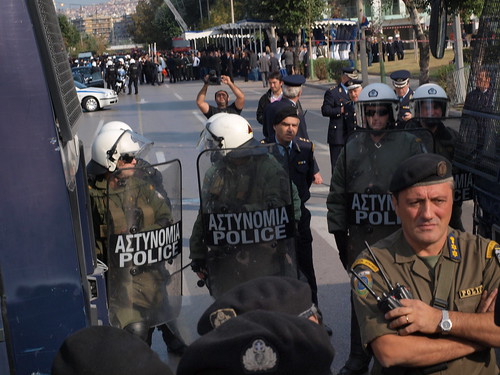
The police also were caught on the hop, unsure of how to deal with mass of people that included pensioners, small kids as well as political activists and unruly football fans. Despite being given orders to disperse the crowd by the minister of defence Panagiotis Beglitis, local commanders kept their response low key, realising the use of tear gas and percussion grenades (the usual police respone to mass unrest) could have catastrophic results in such a tense situation. Instead they allowed the protesters through police lines so they could continue their own people's parade that cheered on all non-military units that marched through.
There were some clashes when army reservists taking part in the military parade tried to force their way through leading to fist fights with protesting football fans who lashed back (see video below). Thankfully, cooler heads prevailed on both sides and no one was seriously injured.
When I got on the internet I saw that similiar protests were taking place across the country, even in small towns not noted for their radicalism, in most places the presence of politicians acted as trigger for people to boo, jeer and throw objects.In many cases mayors and MPs had to be hustled away under heavy police guard lest locals let their anger get the better of them.
On the other hand the mainstream Greek media was mixed in its response to the day's events, TV channels such as Skai, Mega and Star filled their screens with indignant politicians and commentators who accused those involved in the protests from being everything from fascist dupes to mindless hooligans.Yet even with this heavy handed orwellian spin doctoring the images that showed town after town demonstrating and the street of Thessaloniki teeming with protesters clashed with the official line which claimed that all of this was the work of a few hundred political malcontents.
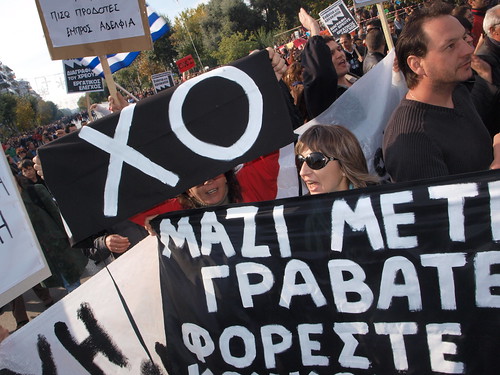
It is a sign of how hunkered down the country's political leaders are that they have started believing their own propaganda about protesters being a small group of malavolent trouble makers being used by dark (and always unnamed political forces). On the other hand the sheer scale of the demonstrations has finally woken some up to the fact that that they are loathed and dispised by people from across the political spectrum.
For the more conservative elements Papandreou's acceptance of foreign oversight is nothing less than treason, for those on the left the government has failed to protect the poor and the vulnerable and is happily dismantling what passes for a welfare state in Greece. For nearly everyone the latest austerity measures have hit them hard coming as they do at a time of falling incomes, rising prices and skyrocketing unemployment.
The writing is on the wall for the current political system as it is incapable of producing a credible alternative to the present set up and in such a situation the vacuum that will be created by the fall of the government may lead to turmoil and conflict as groups united only in their common hatred of PASOK clash with each other.
Saturday, October 08, 2011
Euroman, the EU's newly minted banking superhero goes into action
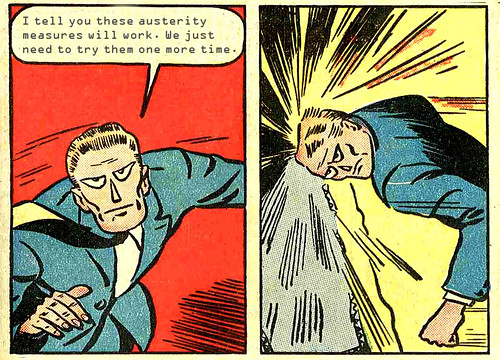
Euroman, the EU's newly minted banking superhero goes into action, a photo by Teacher Dude's BBQ on Flickr.
Friday, October 07, 2011
Friday, September 30, 2011
Friday, July 01, 2011
The Battle for Athens. The day after.
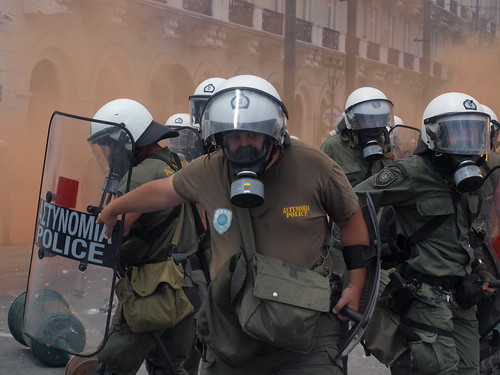
Greek police getting ready to attack protesters in Syntagma Square, Athens, a photo by Teacher Dude's BBQ on Flickr.
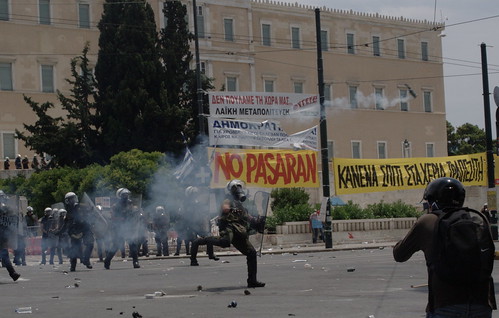
When I got back from Athens the first thing I did was take a shower to wash away the stench of tear gas, Maalox and fear that had hung around me since the morning. Although I have seen my fair share of violent clashes here in Greece, including the uprising in December 2008, nothing had prepared me for the sheer level of savagery shown by the Athens riot police. More than once I saw them act like wild animals, pouncing upon anyone foolish enough to stop to plead or remonstrate with them
Time and time again the police sent vollies of tear gas into packed crowds and it's only by a miracle that no one got crushed under foot as thousands of people ran panic striken from the gas and flash grenades. Nor did this stop throughout the day, from the moment the trouble started at 1pm till after midnight Syntagma Square smelt and sounded like a war zone with an almost continous series of loud explosions and renewed tear gas attacks on the Los Indignados encampment.
Even as far away away as Monesteriki (a neighbourhood about 1km from parliament) rampaging motocycle officers created havoc as they attacked peaceful protesters in cafes and tavernas and gunned their bikes along narrow streets packed with tourists drinking coffee outside.
At no point did the level of police response correspond with the threat they were facing, instead of calmly dealing with a small group of stone throwing trouble makers they launched an all out attack on five fronts against demonstrators which succeeded in provoking a furious reaction from a much larger section of the rally who had outraged by the scenes of uncontrolled police violence they were witnessing.
If such violence had been restricted to an handful of officer or units then perhaps you could talk about rogue officers acting unlawfully, but the scale and the duration of the operation left no doubt that police were under direct ordrs to do everything in their power to break up the demonstration and make sure those taking part would not regroup. In that way the country's political leadership and ultimately, prime minister Giorgos Papandreou took the decision to surpress the anti-government protests in manner more befitting the brutal regimes of Egypt and Tunisia than any EU member.
This is a decision that may buy the ruling PASOK administration some time as people reel in shock from the violence but in the long term has severely damaged, perhaps irreparably the credibility of Greek parliamentary democracy and probably will be the final nail in the coffin of PASOK as a viable political force in future elections.
In a country where folk memories of previous state violence run deep, sometimes going back generations the events of the 28th and 29th June are not likely to remain fade any time soon..
Subscribe to:
Posts (Atom)

